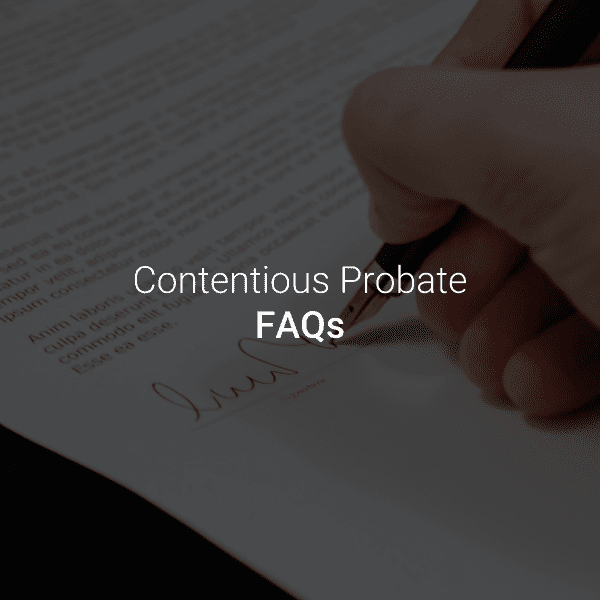Contentious Probate Frequently Asked Questions
Home → Contentious Probate → Contentious Probate FAQs
1. What might make a Will invalid?
There are a number of factors which may make a Will invalid, for example;
- The deceased not having the mental capacity at the time the Will was made;
- The Will was not signed appropriately;
- The deceased was under the inappropriate influence of someone else when they made their Will;
- The Will is a forgery;
- The Will was revoked by a marriage.
This is by no means an exhaustive list of what may make a Will invalid. If you are concerned about the potential validity of a Will, then please contact us for urgent advice.
2. How do I contest a Will?
This will really depend on what grounds you are contesting a Will. Once the grounds for a claim are established, the time limits for bringing a claim needs to be checked, as these vary considerably depending on the nature of the claim.
Consider entering into negotiations with the other side, to attempt to resolve the dispute efficiently. However, if negotiations are not successful, then you will need to follow the court’s protocol before lodging a claim with the court.
If all else fails, you will need to commence court proceedings to make your claim.
3. How do I find out if someone has left a Will?
If you are unsure, then the deceased’s family will need to search their house to see if they can find evidence of a Will. If no Will is found, then enquiries need to be made with the deceased’s solicitor, or bank and also at their local District Probate Registry.
If no Will is found, then it is possible that the deceased did not make a Will, in which case the ‘rules of intestacy’ will apply. These rules are the law which sets out how a deceased’s estate will be distributed and who will benefit from their estate.
4. What is a probate caveat?
A probate caveat is a mechanism to stop an application for probate, which is needed to distribute the estate of the deceased. It is done when there is a dispute about who can apply for probate, or whether a valid Will exists etc.
A probate caveat needs to be given to a probate registry promptly once the person had died.
A caveat lasts for 6 months and therefore needs to be regularly reviewed.
5. How long does it take to make a claim?
It really depends on the nature of the claim being made. There are a number of claims relating to contentious probate, such as a claim where the validity of a Will is the issue or a claim where someone thinks they should benefit from an estate but have not been left anything.
It also depends on whether the dispute needs to be resolved by having a court hearing, or if an agreement can be reached either in negotiation or mediation.
Worst case scenario it could take a couple of years for a contentious probate case to be resolved, just depending on how complicated the issues involved are and what stance the other side takes. However many cases are resolved much more quickly than this.
6. Is it worth trying mediation?
It is always worth trying to resolve a dispute without having to go to court. Court proceedings are often expensive and are therefore best avoided where possible. Some form of mediation may assist to either completely resolve, or at least narrow, the issues between those in the dispute regarding a Will or a probate matter.
7. Will I have to go to court?
If you cannot resolve the dispute in another way, such as through negotiation or mediation and you wish to pursue/defend your claim, then you will have to go to court to obtain a decision that is then binding on everyone.
8. What is the Court of Protection?
The Court of Protection is a court which makes decisions for people who cannot make decisions for themselves because they lack ‘mental capacity’ which is the ability to make an informed decision about their welfare or financial issues.
If someone is not able to make a Will because they do not have mental capacity, then a Statutory Will can be made for them. The Court of Protection will have to give permission for a Statutory Will to be made and the Court will want to be sure that this is in the person’s best interests.
14. Ask another question
Do you have another question relating to Contentious Probate that hasn’t been covered in our guide? Simply get in touch with Richard Nelson LLP’s Contentious Probate solicitors and our team look to respond to you as soon as possible.
If you benefitted from the information provided in this guide, we recommend viewing our dedicated contentious probate services.



